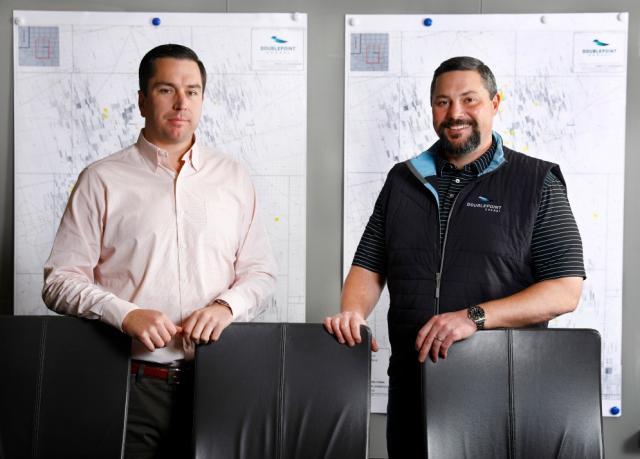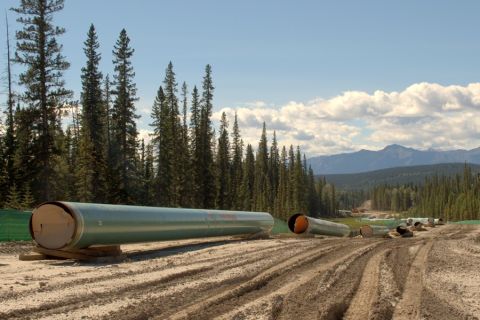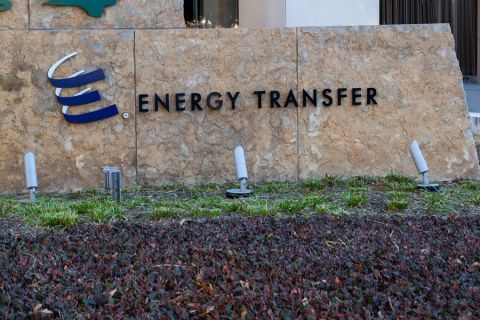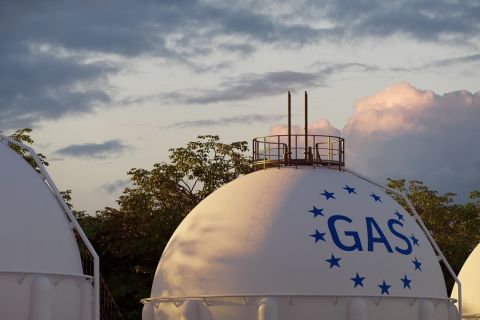
Double Eagle co-CEOs John Sellers, left, and Cody Campbell have embarked on their third iteration of their oil and gas company with a new game plan to build inventory and production and perhaps even go public rather than flip their assets to the highest bidder, as they’ve done previously. (Source: Tom Fox/Hart Energy)
[Editor's note: A version of this story appears in the February 2019 edition of Oil and Gas Investor. Subscribe to the magazine here.]
They called him “the Doomsday Guy.” This man wanted gold for his oil and gas lease—literal gold.
This was not unusual. Cody Campbell and John Sellers, co-CEOs of Double Eagle Energy Holdings III LLC, often run into sellers who ask for unique currency to seal a deal.
“Most people want money,” Campbell said at the company’s offices in Fort Worth, Texas. Sellers, sitting next to Campbell, interjected, “But surprisingly, that isn’t always the motivator. That’s what motivates us.”
Campbell said, “You just have to figure out what it is the person wants. If we’re dealing with a guy out in West Texas on an oil and gas lease, or we’re dealing with an investment banker or private equity in New York, you have to be able to relate to different types of people.”
Doomsday Guy, it seems, had little faith in the value of U.S. currency. “We found a way to get $500,000 worth of gold coins to a town in Lavaca County, Texas,” Sellers said. “They had to have an armored car deliver it to him.”
Campbell added, “We’ve dealt with literally every walk of life that you can imagine. Most of the ‘asks’ are something specific to a lease, or it’s a deal point. It’s usually not something weird.”
Sellers and Campbell have been remarkably successful in their short time in the oil and gas business. Their largest deal to date was the April 2017 sale of 71,000 net Midland Basin acres to Parsley Energy Inc. (NYSE: PE) for $2.8 billion.
The payoff was perhaps more impressive given that Campbell and Sellers stepped into the industry roughly 10 years ago, admittedly with limited experience in it. Since forming Double Eagle in 2008, the pair has overseen more than 10,000 individual lease transactions, totaling more than 1 million acres and more than $5 billion in transaction value.
Within months of the sale to Parsley, Double Eagle created its third iteration with backing from Apollo Global Management LLC. In February 2018, it secured more than $1 billion in equity commitments with the support of Apollo and Magnetar Capital LLC.
In June 2018, Sellers and Campbell partnered with FourPoint Energy LLC’s Permian subsidiary to form DoublePoint Energy LLC. The pair runs the company as co-CEOs, while FourPoint president and CEO George Solich is executive chairman. FourPoint Permian LLC’s equity backers include Quantum Energy Partners LLC and GSO Capital Partners LP.
RELATED: FourPoint, Double Eagle To Form Midland Basin Pure-Play
Today, the E&P has a 95,000-net-acre position in the core of the Midland Basin, which Campbell and Sellers said is among the best basins, if not the best basin, in the world. Their position has been cobbled together through deal after deal with ranchers, farmers, major oil and gas companies, and everything between.
The Texas footprint encompasses parts of northeastern Midland County, a large position in north-central Reagan and Upton counties, and sizable blocks in Glasscock and Martin counties.
What’s striking about the two men—both still in their 30s—is how easily they laugh with—and at—each other, a product of being friends since they were 12 years old. Both went to high school in Canyon, Texas—home of the Eagles, the inspiration for the company’s name—and played football together at Texas Tech University.
“We grew up together,” Campbell said.
As co-CEOs, both are equals; the structure provides two decision-makers, but each is able to act alone. They have a “trust factor” that allows them to work without worrying about what the other does or his motives, Campbell said. Their decision-making process is difficult for others to understand.
Asked about business disputes, Campbell responded dryly, “Yeah, I would say we’ve never disagreed on one deal”—prompting instantaneous laughter in the room. “We disagree all the time. The relationship is very organic. We kind of know how to work with each other and get things accomplished.”
Sellers, picking up the thread of his partner’s remarks, said he couldn’t recall a deal that wasn’t done due to the objection of one. “I think we always come to the agreement that we’re going to be right together or wrong together. We both have the same general outlook.”
Learning With Legends
Double Eagle’s executive offices offer a mixed décor of football memorabilia—a 2005 AFC South Division Championship football, a helmet signed by Hall of Fame quarterback John Elway, a Texas Tech jersey—and desktop Lucite tombstones commemorating their deals.
A slate-gray, Oklahoma-shaped plaque recognizes Double Eagle’s $251 million sale of Scoop and Stack acreage in 2014 to American Energy NonOp LLC, an affiliate of the late Aubrey McClendon’s American Energy Partners LP.
On a warm mid-November day, Sellers and Campbell sat a chair apart at a long conference table in the new office they’d relocated to about a month before. “We couldn’t afford an office like this when it was just Cody and me,” Sellers said.
Their first—between Dilley and Big Wells, Texas, about 80 miles southwest of San Antonio—was insect-infested. “It was terrible,” Sellers said. Campbell added, “Yeah, it was terrible.”
They nevertheless feel indebted to the people who gave them a space to use, and they keep in touch monthly, if not weekly. Sellers said, “There were a number of people that really helped us get going. They’ll be lifetime friends.”
The co-CEOs’ business is relationship-built. Often, they’ve put together multiple deals over the years with the same landowners. Hands-on on that, “they’re out there working with every landowner that we transact with,” said Joshua Gregg, CFO.
The team knows the prices on the ground and the people. Besides, Campbell said, “we’re not too good to get our hands dirty.” Sellers added, “It’s a part of the business we really enjoy. If we didn’t do that, it would take a lot of the fun out of it.”
The company owns a house and an office in Midland that they usually visit a couple of days each week. Both Sellers and Campbell have worked to build a reputation of being easy to work with, fair and “good to our word,” Campbell said.
While students at Texas Tech, Campbell and Sellers started a real estate business. Campbell cashed out after signing with the Indianapolis Colts. But the two friends kept in touch.
A pectoral injury ended Campbell’s brief NFL career. The housing bust tore down Sellers’ real estate business in 2008.
Taking advice and coaching from friends, the two men began working in oil and gas. Land deals, Sellers said, are more or less the same as real estate transactions. And what they lacked in industry knowledge, they made up for with a lifelong pursuit of deals and finances.
Sellers once thought he would end up a third-generation cattle-trader. He entered his first contract to sell cattle at about 8 years old. His grandfather grew up dirt poor, he said, and tended not to cut people any slack or give out attaboys.
“He was very tough, very smart, but very fair,” he said. “I hope people see me as a fair dealer.”
Campbell’s interest in finance grew out of gifts from his grandmother, who had a stock-trading club with her friends. Campbell would sometimes receive stock for Christmas.

“She’s the one that got me interested in investing. I majored in finance in college because of that. I did pretty well. If you buy stock and never sell it for 10 years, it tends to do OK,” he said.
“What did she give you?” Sellers asked, leaning back in a conference chair. “I remember she had that investment in AT&T [Inc.] or something.”
“[Walt] Disney [Co.] or something like that,” Campbell replies. “I can remember they bought Yahoo [Inc.] really early on, before the dot-com bubble.”
Schooling in the oil and gas world was far more abrupt. Both men were determined to succeed, since the alternative was to not have any money. “We really didn’t have any safety net,” Sellers said.
Campbell looks back at the mistakes they made—how they could have reduced their risk, increased profitability or negotiated agreements. “We learned by doing,” he said. “Really, it’s a very expensive way to learn. But I think it’s probably the best way to learn.”
They also dealt with heavyweight industry executives, including almost daily interactions with McClendon to whom Double Eagle sold hundreds of millions of dollars worth of Permian leases in unpublicized deals.
The duo recalled McClendon as an impressive, almost overwhelming, figure. “He would ask very pointed questions, and it was almost like an interrogation,” Campbell said. “I supposed we passed muster because he liked us and we were able to get a lot done with him.”
Double Eagle’s Scoop and Stack deal with McClendon featured finalized negotiations by email or text messages. During that time, at dinner during a NAPE conference in Houston, McClendon sent a message asking where the deal stood.
“We just threw him a price,” Sellers said. “He kind of haggled for 30 minutes. And literally, as we were at dinner, on our iPhones, [we] kind of cut a deal with him.”
Campbell and Sellers took lessons, good and bad, from McClendon and other industry titans they’ve dealt with. In McClendon, they saw an aggressive, decisive dealmaker.
“The thing we learned the most was [that] you can think you’re extremely right about something, but there’s a chance you’re extremely wrong,” Sellers said. “That was one thing about [McClendon]. He was not price-sensitive.
“That’s something we’re extremely focused on—trying to make as good a deal as we can. And if we lose a deal, we lose it. With Aubrey, if he wanted something, he was just going to do it.”
The Running Car
A certain mythos that has grown around Campbell and Sellers’ business includes stories of document-signings hosted on the hood of a car. Campbell said dealing with farmers and ranchers means meeting them at their office. “Their office is out in the field somewhere, the pasture. You go out there and meet up with them to get them to sign the lease.”
After selling a Midland Basin portfolio to Parsley, Double Eagle returned to the Midland Basin. The leasehold—about 90% HBP—has been painstakingly assembled through roughly 1,000 transactions, supplemented by a large acquisition this past summer. The pair is also building net revenue interest, owning about 16,000 net royalty acres.
“We continue to buy more acres where we can, more royalty [interests] where we can,” Sellers said. To stitch together “drillable lanes,” Campbell said, “we paid healthy prices for many of the interests. But, again, we’re very focused on buying the highest-quality acreage possible. And we’re willing to pay more because of that.”
Gregg said, “You name it, our land team has tried it. And we’ve worked with everybody out here.”
Looking ahead, Campbell said, “I think 2019 is going to be a very active year from an A&D standpoint in the Permian as a whole, but especially in the Midland Basin. I wouldn’t rule anything out, but we don’t have any plans to go to the Delaware.”
In fact, the company doesn’t have plans to go anywhere. Its position has been delineated by offset operators that include Concho Resources Inc. (NYSE: CXO), Parsley Energy, Pioneer Natural Resources Co. (NYSE: PXD) and Diamondback Energy Inc. (NASDAQ: FANG).
Double Eagle has enough capital for a robust drilling program this and next year, Campbell said. It has four rigs drilling for it now and plans to run up to 10 as it takes its asset further down the development path with FourPoint.

Assembling Double Eagle’s newest Midland Basin position, which now totals about 90,000 acres, has focused on stitching together “drillable lanes.”
DoublePoint is beefing up its back office as it keeps open the option to go public, “so we’re fully prepared to take it down that path if the need and opportunity are presented,” Campbell said.
Double Eagle II had been teed up for the IPO option before selling to Parsley instead. Gregg said its value was tied to “what we call around here ‘the running car.’” In contrast to something sitting on cinder blocks, “the running car” has drillable locations, built-out surface infrastructure facilities, saltwater disposal and access to water.
“If you build that all out and you can show internally or to the next buyer that you can put multiple rigs to work—immediately—that is how you differentiate the company and create additional value,” Gregg said.
Double Eagle III is being tuned up the same way, Campbell said. “We’re working on building a running car. We want something that somebody can jump into with the engine running,” Campbell said. “And just kind of haul ass.”
Darren Barbee can be reached at dbarbee@hartenergy.com.
Recommended Reading
For Sale? Trans Mountain Pipeline Tentatively on the Market
2024-04-22 - Politics and tariffs may delay ownership transfer of the Trans Mountain Pipeline, which the Canadian government spent CA$34 billion to build.
Energy Transfer Announces Cash Distribution on Series I Units
2024-04-22 - Energy Transfer’s distribution will be payable May 15 to Series I unitholders of record by May 1.
Balticconnector Gas Pipeline Back in Operation After Damage
2024-04-22 - The Balticconnector subsea gas link between Estonia and Finland was severely damaged in October, hurting energy security and raising alarm bells in the wider region.
Wayangankar: Golden Era for US Natural Gas Storage – Version 2.0
2024-04-19 - While the current resurgence in gas storage is reminiscent of the 2000s —an era that saw ~400 Bcf of storage capacity additions — the market drivers providing the tailwinds today are drastically different from that cycle.
Ozark Gas Transmission’s Pipeline Supply Access Project in Service
2024-04-18 - Black Bear Transmission’s subsidiary Ozark Gas Transmission placed its supply access project in service on April 8, providing increased gas supply reliability for Ozark shippers.





